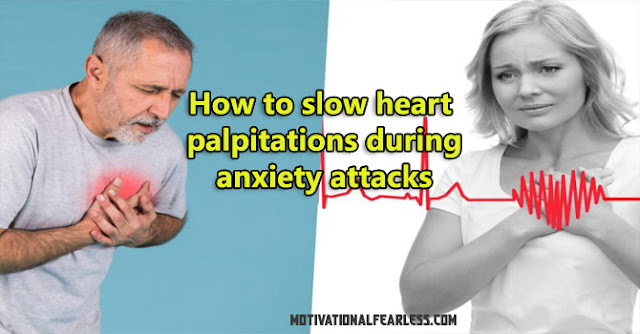How to slow heart palpitations during anxiety attacks
Here are different medical and non-medical approaches to stopping heart palpitations due to anxiety.
Anxiety attacks can cause your heart rate to increase, making your heart seem to be beating faster. This feeling is the result of the fight, flight, or freeze response, where the body reacts to protect you from danger. Anxiety-related heart palpitations are usually not dangerous, but they can increase your anxiety and lead to other complications. Here are different medical and non-medical approaches to stopping heart palpitations due to anxiety.
What you need to know about heart palpitations
A normal heart rate ranges from 60 to 100 beats per minute. When it goes above 100, you may feel it throbbing or feel a thumping or skipping sensation. Typically, anxiety-related palpitations are temporary and infrequent, but they may last longer or be more intense during panic attacks.
How to Slow and Stop Anxiety-Related Heart Palpitations
If your heart palpitations are the result of anxiety and not another condition, the best way to manage them is to treat the underlying cause: the anxiety. If you experience heart palpitations due to anxiety, here are some techniques you can try now to manage your symptoms.
Focus on your breathing
Mindfulness, meditation, and deep breathing can help calm your anxiety and stabilize your heart rate. Anxiety can take you by surprise and you may be able to ignore it until it starts to affect you physically. Palpitations may be a sign that your anxiety is spilling over from your mood and emotions into your physical functioning. Try slowing your breathing, meditating, or sitting in a quiet space for a few minutes to calm your mind and body.
Exercise
Being active and exercising isn't just good for your body. Physical activity can support heart health to help prevent the underlying causes of heart palpitations, but it also releases endorphins. Endorphins are chemicals that your body produces to help you cope with stressful situations, and exercise causes a rapid release of these substances.
Use your body’s “cheat codes”
You can try a few maneuvers to help your body compensate for any emotional or physical stress you're feeling. When you feel anxious, your body reacts physically by activating your fight or flight response, and heart palpitations are something you might notice with this response. The vagus nerve acts as a pacemaker, and specific activities like contracting as if you are going to have a bowel movement and the Valsalva maneuver can sometimes be used for immediate control of a high or irregular heart rate.
Eat or drink
Eating or drinking is a simple and basic task. But by stopping to have a snack or something to drink, you allow your body to perform an automatic task. The action of swallowing forces you to breathe more slowly, and this concentration can help calm your palpitations.
Ask for help
If your heart palpitations progress to the point where you feel dizzy or dizzy, seek help. Anxiety may be the cause of your heart palpitations, but there are also physical reasons that can cause this. If you have symptoms such as chest pain, dizziness or loss of consciousness, you should seek medical attention immediately.
Ask for help again
If you've ruled out the underlying physical causes and your heart palpitations persist, even after strategies like meditation and centering, you may need to consider additional support. Talking to a licensed therapist or counselor can help you address some sources of your anxiety and learn how to manage it effectively to avoid physical manifestations of these emotions.
Consider medication
If your anxiety still causes physical discomfort after trying certain behavioral strategies, you may want to talk to a healthcare professional about anti-anxiety medications. Although the activities and techniques discussed above may offer immediate relief in the absence of medical help, if you experience persistent heart palpitations associated with your anxiety, it is important to consult a healthcare professional for further advice. ongoing treatment and support.
Managing stress and anxiety without medication
Around seven million adults live with anxiety disorders at any given time, and there are e a wide range of treatments available. How you manage your anxiety may be linked to its impact on your quality of life. For some people, regular non-drug techniques can help control anxiety and related symptoms.
Some non-drug strategies for managing anxiety include:
Mindfulness and meditation activities
Yoga and other relaxation exercises
Breathing exercises to support deep breathing
Cognitive or behavioral therapy with a licensed counselor or therapist
Support groups with peers who share your challenges
Medications prescribed for anxiety
If non-drug strategies for managing your anxiety are not effective and you continue to experience heart palpitations, among other symptoms of anxiety, talk to a healthcare professional. They may prescribe medication to help you manage your anxiety.
There are different types of medications to treat anxiety, each with benefits and side effects. Everyone reacts differently to medications. Finding the right treatment for you may require trial and error or a combination of medications.













Post A Comment:
0 comments: